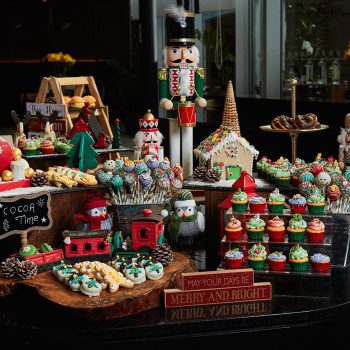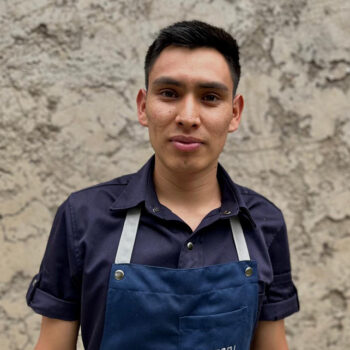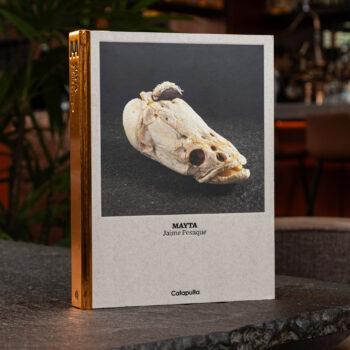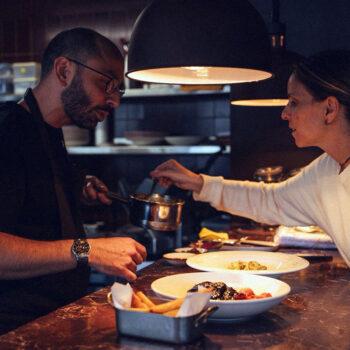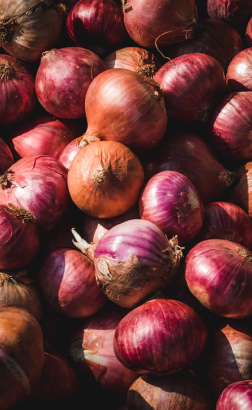Words Paola Miglio (IG @paola.miglio) / Cover Photo Gustavo Vivanco
It is the last service of the season at Mil Centro (Moray, Cusco). The following day the restaurant will close its doors for roof and floor repairs because up in the altitude, at almost 4000 meters above sea level, the climate and passing of time are unforgiving. Fret not though, as the restaurant will reopen on the 18th of December, and even though the kitchen is quiet, the team continues to work. This interdisciplinary group that has been forged by the original trio – composed of Virgilio Martínez, Pía León, and Malena Martínez – weaves together the various areas of research that make up Mater Iniciativa, a gastronomic research center. The surrounding fields have turned golden in anticipation of the rainy season that should begin in the upcoming months. The scenery drastically mutates as time goes by; it waits for no one, and those who arrive must learn to understand it and adapt to it and those who inhabit it. It is only fair. The same happens in the MIL dining rooms, in the Kjolle and Central dining rooms in Lima, and in the Maz dining room in Tokyo, as they too are nourished by Mater Iniciativa.
Virgilio Martínez’s search is not over yet; it has become a challenge – simultaneously enriching and intense. Central just won first place on the list of the 50 best restaurants in Latin America, and just a few months ago secured second place in the world. And while these accolades delight him and his team, they are not his ultimate goal in this journey. Instead, he strives for a transcendence that cannot be measured by trophies.“Everything builds on the thing before it”, he always repeats, even the stumbles and errors he has made, which he humbly recognizes. But the road is long, and, despite the fast-paced nature of these times, it is moving away from the immediacy and is prioritizing a measured reflection. That, he has perfectly clear.
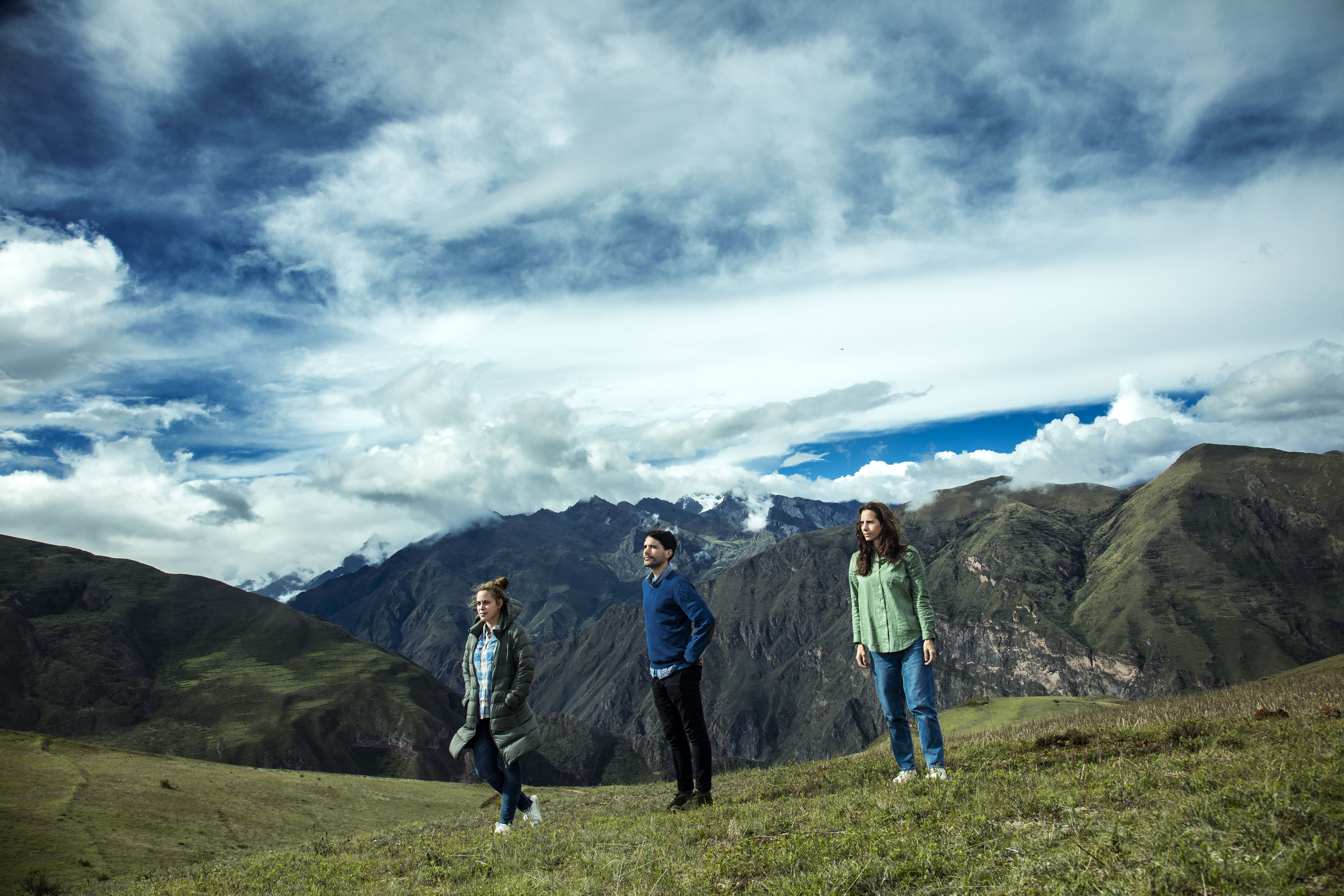
Team also led by Pía León and Malena Martínez. Photo courtesy of Mater Iniciativa. Photo Gustavo Vivanco.
“Peru has never been above anyone or anywhere else, nor were we ‘the first». Those kinds of comparisons won’t get us anywhere. Each region and each country has its way of seeing things, and the good thing is that we are continuously more united and always learning new things. When Peru is seen as an example, it is because we were able to connect with the world through Mistura with Gaston (Acurio), an indisputable leader, and we have chefs who express their gastronomy, and we see things from a more horizontal perspective. We understood that the only way to really grow was to stop competing for clients, and begin to work together.” Virgilio Martínez.

Sang Jeong, Virgilio Martínez y Santiago Sosa en las alturas de Cusco. Foto Gustavo Vivanco.
Each time one returns to MIL Centro, it has changed. This time, it feels a lot more solid. Even the investigation area is more set up, and more coherent. What do you feel has been achieved since its opening in 2018? MIL is a constantly evolving concept, we never see it as finished. We will always look towards a better MIL, at least that is what I hope for. The core idea is intentionality: when we opened it was an adventure, now, it is a certainty. A restaurant at almost 4000 meters above sea level, approximately two hours from the city of Cusco; not a tourist destination, but a place where a lot happens. Investigations, constant reflections, working with local producers and communities, being close to our products, and land preservation. We are constantly questioning ourselves.
The proper functioning of the dining room, the organization, these are key points that you have also emphasized. I am super happy because it is a better MIL: the mise en scene, what we serve, it is coherent with our philosophy, and the place is beautiful. There is a dialogue with what you can find in the surrounding area, everything comes from here, except for a few things – the products of collaborations with oenologists or distillers who work across the Andes Mountain Range, from end to end. This is Luis Valderrama’s team. He is a chef who offers an experience that integrates you into the land and even incorporates Moray’s presence, there is a communal labor at work. Of course one must not take anything for granted, each day brings its lessons. We continue to build upon what works.


The MIL team at the end of the service on the last day of the season. They re-open on the 18th of December. Photos Gustavo Vivanco.
In a time where everyone is talking about working with communities, and forging relationships with producers, achieving horizontal work relationships continues to be complicated in Latin America (considering ethnic and class inequalities) because the chef is usually seen as ‘the savior’. How have you managed to build these relationships? It has taken years, MIL did not open from one day to the next. We created an interdisciplinary connection, which has grown into an exchange that must be beneficial to both parties. So, the moment it ceases to generate benefits for either of the parties involved, it isn’t working. Although it is hard to measure if there is more growth for the other or more growth for us because there is a collective aspect and another, individual and personal aspect. The idea is not to think that we are a temporary restaurant, and that gives the feeling of a certain degree of transcendence because then what you do has an impact, it generates something good. In Latin America, due to preconceived notions, one might believe that it is easier to work with rural farmers, artisanal producers, local communities, because they are closer, because there is less industrialization; but it is also difficult because these communities aren’t protected, they have been isolated for a long time, devoid of attention, and that has stunted their development. There are also NGO’s who have intervened in unproductive ways. That is something that we are very considerate of when we begin to build ties and trust.
You spoke about mutual understanding, and that many NGOs arrive and impose foreign models that don’t necessarily work with our cosmovision. Yes, they arrive with a model that works in Nigeria, for example, and try to develop it in Peru, and it is not applicable: they are in another land, another culture, working with other people. Despite the good intentions –and that is something else we have learned-, that as enthusiastic as we may be, we can do things very wrong. It has happened to us. Working with communities is not easy because of the degree of distrust, the carelessness that they have experienced from the big cities, from the governments, because of that structure that has been pushing us towards centralism for centuries. I am not saying that there are no good projects, they are just very difficult to achieve. It is not about arriving and imposing a way of working: when it is done this way – perhaps intuitively or out of enthusiasm, without considering the repercussions, and there no research is done – this can damage and break a relationship. At the end you want to be more than just good neighbors who understand each other’s differences: each one has their own vision of the world, a cosmovision that must be respected.
A great lesson on humility for those who arrive from afar: assume you don’t know it all. An attitude that is lacking in most restaurants. It might be contradictory. This image of the chef, the face of the operation, and people want the chef to be that, since it is assumed that this person has done it all. It is complicated because, while it might fare well for the ego, it damages one’s mental health in the long term. This job has gone through hundreds of people, knowledge, respect, through many factors, and you are only seeing the superficial layer: lovely, but it is thanks to the roots that have been established, to all the hard work and knowledge that come through many artists, in which the chef has little participation. For example, there are cases in which that top layer is so big and so beautiful, but it doesn’t have any base or context, so it falls apart. That is why I value jobs and thoughts in the long term, it is so important. It may sound cliché, but that’s how it is.
How can you transmit all this knowledge and information that you are collecting and accumulating? The knowledge is really important to us, getting people excited. We communicate through our visitors and our channels; we want it to feel like we are working with direction. We have certain goals that we set for ourselves and we want to show that it is possible to achieve them. Sometimes, superficial things or world recognition makes it seem like we are on the crest of the wave, but the reality isn’t exactly like that. There are regions of Peru that are so rich, and there are so many things constantly being lost. We are clearly not going to get to everything, but we hope that others might. That is what we are always saying: we want to contribute, even if it’s just to provide a replicable model of responsible work.

Mater Iniciativa projects: preservation, salt, herbs, and distillery. Photos Gustavo Vivanco.

But not everyone can visit, there is a rupture there. Besides social media, how can you democratize that information? That has been a constant conversation over these last years: how to reach more people in a better, easier way. We continue to make publications; for example, we just closed a deal to make another book with Mater Iniciativa about 30 species. I would love to say that we have an established strategy, but I think that we are still in a place in which we have some internal issues to resolve. Malena’s (Martínez, Director of Mater Iniciativa) job, for example, is the hardest to communicate.
And the most delicious. Fine dining is at Mater Iniciativa. It hasn’t ended, change its name if you want, but it is still there. It is about how much time you dedicate to something that makes sense and works, that perhaps won’t make you money, but, rather, will give you satisfaction, and you get to present someone with something they have never experienced before. You are going to motivate them to get excited about what we do.
Looking for transcendence in a time of immediacy, during one of the worst information crisis in history. A Little contradictory, no? We also have to work on digitalization. I think it is important to mention. Obviously the work is natural, organic, but the world is recalibrating itself, and these micro-messages, for example, our attention spans, even for feeling, are dwindling. We have lost the capacity to read books and this is one of the richest connections to something, it is an activity that demands two or three hours and it nurtures you. One is oblivious to this frenzy because we are blinded by this “box -ticking culture”: I ate there, I tried the coffee, I went to Moray, I went to this country, now what? The challenge is to stop and make sure that the ‘pretty’ moments also serve to add real content to your life. To our lives. At no point should we lose the desire: it is easy for me to say that. I am 45, not exactly young; but I still love to get excited and there are chefs who I admire, who still get excited about their projects. To wake up knowing that the next day brings interesting things, not to see it as too much work, rather, to see it as something stimulating. So, if we are talking about making a quick impact, it is easy to shoot all over the place, but at the end of the day, you aren’t accumulating any knowledge. That is the calm that we get from MIL.
BEING EVERYWHERE
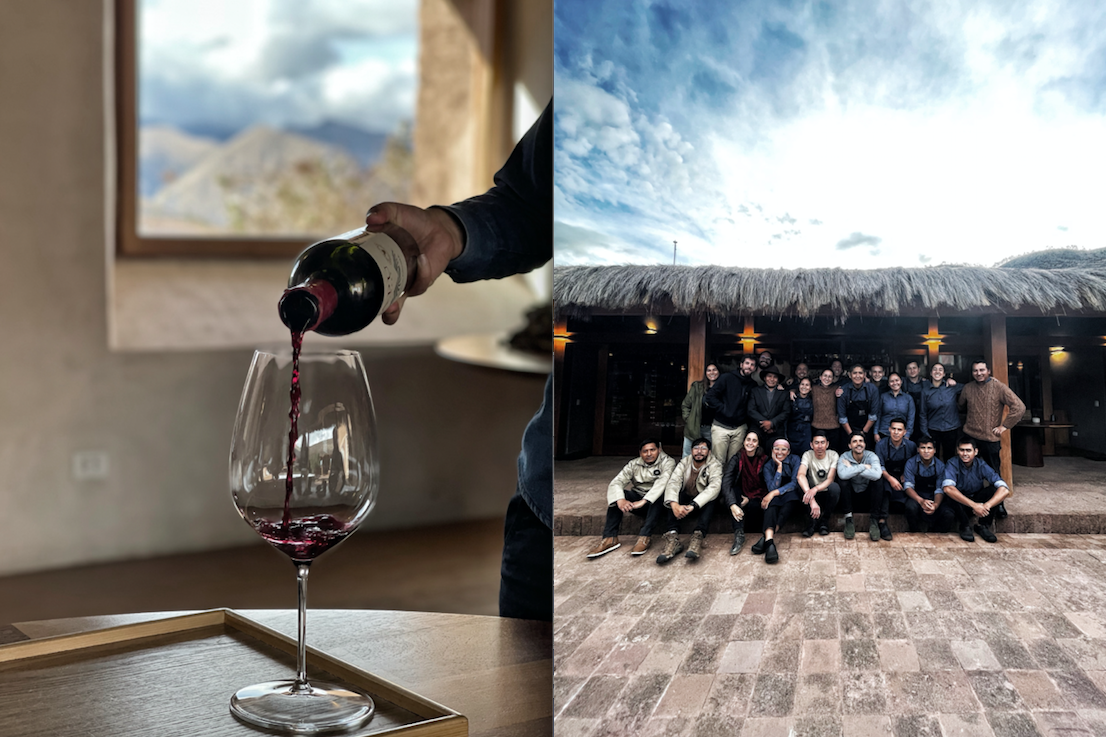
The MIL team the last day of this season’s service. Photos Paola Miglio.
You have managed to be very efficient and it sometimes appears you are in many places at once. How do you get organized? There is the strength that comes with the team, the capacity to create teams. And not just mine, the teams then create more teams. We feel solid, motivated, and secure because security is important, that is for sure. The other aspect is to feel like you are in a good place, that you are proud of what you do. The other day someone mentioned how much I travel and I responded: when I am in a place, I am giving my 100%, enthusiastically. I am here speaking to you, which interests me, and I don’t feel the need to think about my day off or my Sunday. Of course I have free time, but I focus. I think that, as a team, we have come to understand that much of our free time is also related to gastronomy. You don’t have to be cooking all day to be connected, and I consider it a privilege to be able to talk about what I like, to see it, taste it, eat it, cook it, live it, knowing that we are contributing something.
Regarding all the mistakes made and accepted, what has that process been like? You have gone through, and I imagine that you continue to go through, an important process of deconstruction after having grown up and been educated in kitchens that embodied a hierarchical system. We have had to go through serious failures in order to then learn from them, you have to look at it that way; growing as people. If something wasn’t done right, well, it needs to be rectified. It is the learning path. That, and gratitude. I now understand that everything must be taken not only with humility, but also with valor; accept and put your head down when it is time to stay quiet, when there is nothing to be done, when you aren’t having a good day, when you are immobile, when you don’t have anything to say, when you are having a terrible week. We still have them, and it must be said: not everything is successful, because there is always going to be something that challenges the growth. When I stopped working at Astrid y Gaston, and I opened my own restaurant, I thought it was my moment, and that was also an error. I made many. One cannot do things alone in life, you have to be accompanied so that we may always take care of each other. And I’m not saying that these women and men should stay in restaurants their whole lives, this is just what works in our case.
How does one create a team in these times? Listening. Understanding. We know what the teams’ weaknesses and strengths are, we support them to overcome the weaknesses and we let their strengths flow. Santiago (Fernandez) is at Maz, in Japan, and it works the same way with him. I am constantly talking to them, we have open communication because there will always be questions and decisions for which they might feel they need another perspective. We have developed this mentoring project in which we do things together rather than hiring external people to be in charge. One arrives here to follow a career path, if they wish to, starting in the kitchen, in Mater, and then going out into the world with a philosophy. And it is always important to consider that even if you spend many years at Central and leave with knowledge about and experience with fine dining, it is only a tiny piece of what exists out in the world. You have not seen it all, and you do not know it all.
So that is where the search continues, how good do you want to be? That is what it is about, how much time you want to dedicate to what you like. You can’t expect results that don’t reflect the amount of work you put in. Don’t feel like life has been unfair when you haven’t put in the time despite your abilities and resources. This is a problem. We undoubtedly live in a confusing time full of change, in which we are also fighting for liberties and independence, which is why we want to provide certainties: this is a space where there is a place for you, you have a place to work, you have a good job, and tomorrow you will want to continue to do better.
WILL FINE DINING DISAPPEAR?

Mater is fine dining. Photo Ken Motohasi.
There are those who believe that fine dining is going to disappear as we know it (tasting menus). I feel like in Latin America, we are on the path of construction, and we have to determine the rules of our cuisine. What do you think about this? The good thing is that we believe it, hopefully more of us will. It is time to do our thing alone and reflect. I think the key is our capacity to strengthen our identity. How sustainable are you, your life, and your body. In order for Central to be sustainable, or function in a sustainable way, I have to be a sustainable person. I have to make sure my finances are sustainable, and go through all the necessary trials. That makes for a healthy business and team growth. Going back to the Latin American fine dining, I think that we are on yet another path, that we are experiencing another expression of historical wealth and diversity, like those of other countries that have worked for many years or perhaps with more impact or repercussions at the right time. Times and needs transform, and, today, we search for more diversity to understand other cultures. We are no better or worse, I think that we have a different way of expressing ourselves, with authenticity, we are articulating better with our agriculture and our surroundings. We are working better at a regional level, not just so people come to MIL – which we previously saw as the way to generate tourism (and it is a good self-criticism and criticism), but then what would we be leaving behind? How do we sustain? By being consistent.
Mater Iniciativa feeds all your projects. How do you then continue to get feedback and enrich the project without copying or cannibalizing yourself? Something has to exist that projects our ideology, philosophy, and work model, but not a repetition of dishes; a way of working. This isn’t seen from the outside. Visitors will understand that everything comes from somewhere and may appear familiar, and this is what I want when people arrive, I want it to be something that they have felt before, but with its own personality. At the end, it’s about transmitting what we discover and work on here at Mater. I would never see it as copies; there are certain ideas and forms we maintain, and if something is repeated, there is an intention behind it, perhaps a message that we wish to reinforce. Within each project, we express a little bit of everything and we try not to confuse, but at the same time, we rely on it all to make sure the messages are understood.
And as for menu changes, is it finally understood that complete changes aren’t necessary, nor do they make for a better restaurant? They are much more intuitive because there is so much more work, more historical registry of time. We want to conceptualize the seasonal. There is another form of work based on biodiversity, which opens other doors, and we are interested in that right now, the preservation of systems and biodiversity. When we began to talk about ecosystems and altitudes, a huge world opened up. It is quite a change from the seasonal farm-to-table dialogue, and from all that is fashionable or trendy, like saying that you work with farms, or that you are sustainable because you are preserving water, or that your dinnerware was made with residues of I don’t know what. I think we are working with logic.
A TOWN SOUTH OF THE UNITED STATES?

The eternal exploration at Central. Photos Ken Motohasi.

While we talk about Latin America, we need to look deeper. Right now you are in Cusco, and soon in Madre de Dios, but Lima has monopolized the scene, and at this stage of the game there should be a more integrative vision. We aren’t going to solve the issue of centralization in a month or with one ranking, but, what do you think is missing so that the view becomes more panoramic? Do you think we are aiming towards decentralization? Today’s generation is more nature conscious. The climate change messages are an every-day occurrence. People aren’t always looking for foreign foods when they go out to eat. I think all that really helps. I think a decentralization is coming, which is good. And it is not being forced, the good thing is that it is not coming from above, it is not an authoritative order or a plan. This is coming from the collective decision of a new generation that is demanding a more complete Peru. I don’t know if we are more nationalistic or less, but we are definitely more conscientious, cautious, and careful with nature.
And with human beings. A good team and work relationship, fair hours, fair wage, mental and physical wellbeing, because the mental wellbeing isn’t really discussed, it has always been kind of hidden. It shouldn’t be hidden. There is a serious contradiction because, on one hand, a restaurant has to be perfect for the gastronomic critique, and on the other hand, we also have to deal with a team that should be healthy in all ways. The demands are high in the mise en scene, the financial investment in the dining rooms and spaces, in the service, in pricing, in everything. Meanwhile, we have to ensure a safe and healthy environment, lessen the work hours. Both sides need to be seriously worked on because we want the end result to be good, but not at the cost of anyone’s well-being. The reality also plays against us, no one benefits from having an unmotivated chef, no one benefits from going through a pandemic and having big economic holes. These times call for more empathy, and it is also a wake-up call for the consumer. You can’t just go around demanding.
Things were meant to change after the pandemic. We were going to become more conscientious, more human, better people. We spoke about this in our last interview. What do you think happened? The pandemic has generated a state of anxiety and chaos in which we are still submerged. Angst, fear, loss, pain, sadness, it is all expressed differently. We must do the individual emotional work. It is crucial because we need to look inside ourselves, which takes time. We need to check ourselves so we don’t make the same mistakes. We cannot erase what happened, our identities, our stories. We cannot get lost in what might come. We should work to stay in the present and manage our emotions; be cautious and careful with how we treat others and how we treat ourselves. We mustn’t forget to fill up on valuable content, on humanity. (Translation Alejandra Arrarte).
Etiquetas: central, mater, mater iniciativa, pía león, virgilio martínez, moray, mil, cusco
TAMBIÉN PUEDES LEER
TRES EXPERIENCIAS PARA LONCHES DELICIOSOS
Jue 14 de diciembre de 2023
Es el momento de juntarnos nuevamente y disfrutar de tres espacios que serán sabrosos para largas conversas y reencuentros cariñosos.
Leer más
RAFAEL BAYONA: UNA MIRADA A LA AMAZONÍA PERUANA EN LA FINAL REGIONAL DE SPYCA
Lun 26 de agosto de 2024
Conversamos con Rafael Bayona, joven chef y representante peruano en el S.Pellegrino Young Chef Academy 2024-25 para la final regional de Latinoamérica y países del Caribe.
Leer más
CUANDO TENGO ALGO QUE DECIR: LA COMPETENCIA, LA CRÍTICA Y LA COHERENCIA
Jue 23 de noviembre de 2023
Y entonces, en tiempos de inmediatez y de lucha por impulsar a nuevas generaciones, ¿qué sucede por Perú y tierras vecinas? Hay talento, pero ese talento, ¿tiene ganas de escuchar o solo de compartir logros en redes para generar likes?.
Leer más
TE GUSTO LO QUE LEÍSTE












